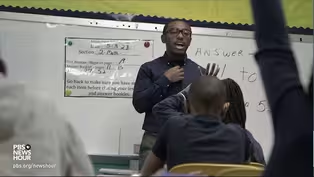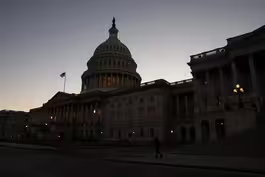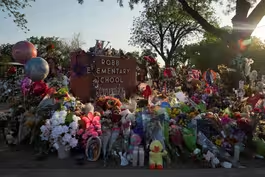
The potential impacts of the U.S. defaulting on its debt
Clip: 5/23/2023 | 6m 8sVideo has Closed Captions
Economist Mark Zandi on the potential impacts of the U.S. defaulting on its debt
The impact of the U.S. defaulting on its debt would be felt by many Americans. It could include suspension of Social Security checks or a loss of food stamp benefits, to name just a few. Many economists argue it would be devastating to financial markets, tipping the country into a recession and creating global turmoil. William Brangham discussed that with Mark Zandi of Moody's Analytics.
Problems playing video? | Closed Captioning Feedback
Problems playing video? | Closed Captioning Feedback
Major corporate funding for the PBS News Hour is provided by BDO, BNSF, Consumer Cellular, American Cruise Lines, and Raymond James. Funding for the PBS NewsHour Weekend is provided by...

The potential impacts of the U.S. defaulting on its debt
Clip: 5/23/2023 | 6m 8sVideo has Closed Captions
The impact of the U.S. defaulting on its debt would be felt by many Americans. It could include suspension of Social Security checks or a loss of food stamp benefits, to name just a few. Many economists argue it would be devastating to financial markets, tipping the country into a recession and creating global turmoil. William Brangham discussed that with Mark Zandi of Moody's Analytics.
Problems playing video? | Closed Captioning Feedback
How to Watch PBS News Hour
PBS News Hour is available to stream on pbs.org and the free PBS App, available on iPhone, Apple TV, Android TV, Android smartphones, Amazon Fire TV, Amazon Fire Tablet, Roku, Samsung Smart TV, and Vizio.
Providing Support for PBS.org
Learn Moreabout PBS online sponsorshipWILLIAM BRANGHAM: So, the impact of the U.S. defaulting on its debt or not paying its bills would be felt immediately by many Americans.
We don't know precisely where the axe would fall, but it could include suspension of Social Security checks or a loss of food stamp benefits, to name just a few.
Beyond that, many economists argue it could also be devastating to financial markets, potentially tipping the country into a recession and creating economic turmoil globally.
Mark Zandi is the chief economist at Moody's Analytics, and he's been keeping a very close eye on these concerns.
He testified before Congress about them, and he joins us now.
Mark Zandi, thank you so much for being here.
What is your sense of confidence about whether our not a deal is going to be reached?
MARK ZANDI, Chief Economist, Moody's Analytics: Well, William, logic dictates that they will reach an agreement.
A lot of drama, Sturm und Drang, but when it gets down to the last minute here, I expect them to come through and pass a piece of legislation increasing the limit.
But, having said that, I -- we have seen many debt limit battles over the years.
This one feels potentially different.
The politics are different.
And, as such, there's not a nonzero probability that lawmakers make a mistake here and breach the debt limit.
So we can't rule that out.
WILLIAM BRANGHAM: Speaker McCarthy says that, just looking at the calendar, they have to strike a deal in the next couple of days in order to make the trains run on time.
The markets have shown some concern over this, but not that much.
Do you think that there is enough fire being applied to the feet of the people on Capitol Hill?
MARK ZANDI: Not enough.
I mean, it's a bit perplexing.
I don't -- I have not heard the pounding on the doors that I typically have in past debt limit dramas from businesspeople, from donors, from voters, from the markets.
I mean, take a look at the stock market.
It's kind of hung in there really very well, no sign of any angst among stock investors, which makes me a bit nervous, right?
Because I do think it takes that pounding on the door to kind of light the fire to generate the political will to get lawmakers to make this tough vote.
And the fact that we're not seeing that makes me nervous.
Now, I suspect, as we get closer and closer to that so-called X-date, when the Treasury can't make all the payments, then markets will react, and we will get that pressure.
But, so far, the people are not as anxious as I thought they would be at this point in time.
WILLIAM BRANGHAM: Let's say that they don't meet that deal.
What happens in the days in the weeks immediately afterwards?
MARK ZANDI: Well, it's a mess, progressively worse mess as hours and days go by.
I think it is important to recognize, though, I don't think the Treasury would default on the debt.
They have the ability to pay bondholders.
It's a separate accounting system, payment system, and they can get that done, because they know, if they don't pay on the debt, that would be like -- words like catastrophic would be appropriate, just a complete, utter fiasco.
But they would stop making payments on all other bills, and everyone would get their money from the government later and later and later, depending on how long this went.
And, of course, investors would be very anxious as well.
Even though they're getting paid, they're going to say, hey look, they're willing to breach this go-around.
What about next time and the time after the time after that?
You, the taxpayer, have to pay me more in higher interest to compensate for that risk.
So the damage would start to accumulate pretty quickly.
Within a few days, I think it'd be so significant that, given how weak the economy already is coming into this, we would be in recession.
WILLIAM BRANGHAM: Do you think that your firm, Moody's, and others would, as has happened in the past, downgrade the U.S.' credit rating?
And I guess my question is really the long-term reputational harm that this seems like it would do to the United States' standing?
MARK ZANDI: Well, if you -- every rating agency is different in terms of their methodology and approach.
If you read what they're writing publicly, I think it would take a default on the debt to actually get a downgrade, at least initially.
I mean, if this -- if the breach extended on for more than a week or two, given the turmoil, they would be under pressure to downgrade at that point.
But you make a great point, William.
Downgrade or no downgrade, the fact that we, the United States of America, can't pay our bills on time -- and we have done that since the founding of our nation -- the fact that we can't get that done will have a big impact on people's trust and faith in us.
And I can't understate more how important that is.
That is critical to keeping interest rates down here, allowing us to invest and be the global engine of economic growth, and not only economically, but geopolitically, and we would significantly diminish that by going down that dark path, if we did breach.
WILLIAM BRANGHAM: You warned about all of this and the coming storm as early as January of this year.
When you see how close we are to the precipice now, does it surprise you how far we have gotten to the edge?
MARK ZANDI: No.
No.
I mean, we -- I have done this for a long time.
I have seen this go right down to the edge every single time.
So -- and it's the politics of it.
There is this aspect of it that's very performative, theater.
There's folks on either side of the aisle here, way on the other side of the aisle, that need to be accommodated, so that you can get enough votes to get a piece of legislation.
And that does require the drama.
So I'm not surprised.
But I am -- each time that we come down to the wire, I get increasingly more nervous, and my level of angst is now starting to grow.
I suspect we're going to come back next few days, certainly after Memorial Day, and lawmakers will start a deal.
But, gee, it just feels very uncomfortable.
And it goes to a broader point.
Yes, this is no way to run a railroad.
I mean, this debt limit thing is not at all productive.
It's highly counterproductive.
We need to figure out a way to get rid of it.
WILLIAM BRANGHAM: All right, Mark Zandi of Moody's Analytics, thank you so much for being here.
MARK ZANDI: Sure thing.
Thank you.
Artist uses architecture of Guggenheim in new installation
Video has Closed Captions
Clip: 5/23/2023 | 5m 49s | Artist Sarah Sze uses architecture of Guggenheim Museum as part of her new installation (5m 49s)
Black teachers counteract dropout rate among Black students
Video has Closed Captions
Clip: 5/23/2023 | 6m 40s | Organization mentors Black teachers to counteract dropout rate among Black students (6m 40s)
Dodgers re-invite drag group to Pride Night after backlash
Video has Closed Captions
Clip: 5/23/2023 | 7m 16s | Los Angeles Dodgers re-invite satirical drag group to Pride Night after backlash (7m 16s)
How the U.S. national debt reached $31.4 trillion
Video has Closed Captions
Clip: 5/23/2023 | 5m 43s | How the U.S. national debt reached $31.4 trillion (5m 43s)
The human toll of the battle for Bakhmut in eastern Ukraine
Video has Closed Captions
Clip: 5/23/2023 | 3m 46s | The human toll of the battle for Bakhmut in eastern Ukraine (3m 46s)
Tenuous ceasefire in Sudan offers some needed relief
Video has Closed Captions
Clip: 5/23/2023 | 5m 46s | Tenuous ceasefire in Sudan offers some needed relief after weeks of brutal fighting (5m 46s)
Uvalde still seeking accountability a year after shooting
Video has Closed Captions
Clip: 5/23/2023 | 5m 28s | Uvalde community still seeking accountability a year after elementary school shooting (5m 28s)
Providing Support for PBS.org
Learn Moreabout PBS online sponsorship
- News and Public Affairs

FRONTLINE is investigative journalism that questions, explains and changes our world.

- News and Public Affairs

Amanpour and Company features conversations with leaders and decision makers.












Support for PBS provided by:
Major corporate funding for the PBS News Hour is provided by BDO, BNSF, Consumer Cellular, American Cruise Lines, and Raymond James. Funding for the PBS NewsHour Weekend is provided by...






